A Mother's Fight for Life

Think about the women in your life. Now, think about who they're in a relationship with. Is that person capable of hurting someone you love dearly? World-renowned security expert Gavin de Becker says you don't need a weapon to protect your loved ones—or yourself—from violence. You just need to open your eyes.
Take Gavin's assessment to help determine if your loved one is at risk.
The Gift of Fear author has advised everyone from the CIA to presidents and world leaders about staying safe. Now, he has a message for everyone about violent crimes committed against women—they are predictable, preventable and often committed by someone they know.
Get the warning signs.
"When you look at the 3,100-odd women who are killed each year in America, the majority of those are by a husband or boyfriend," Gavin says. "In fact, if police detectives come upon the body of a murdered woman ... it is more likely than not to be a husband, ex-husband, boyfriend or ex-boyfriend that did the homicide."
Take Gavin's assessment to help determine if your loved one is at risk.
The Gift of Fear author has advised everyone from the CIA to presidents and world leaders about staying safe. Now, he has a message for everyone about violent crimes committed against women—they are predictable, preventable and often committed by someone they know.
Get the warning signs.
"When you look at the 3,100-odd women who are killed each year in America, the majority of those are by a husband or boyfriend," Gavin says. "In fact, if police detectives come upon the body of a murdered woman ... it is more likely than not to be a husband, ex-husband, boyfriend or ex-boyfriend that did the homicide."
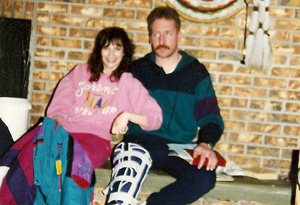
Teri, a mother of three, came dangerously close to becoming a statistic. When she met David, she thought he was the perfect man. "Good job, churchgoing, fun-loving, wanted kids," she says. "What else could I ask for?"
After three months of dating, Teri says David started talking about marriage. "I wasn't really ready for that. It was too soon," she says. "But he persisted and persisted, so of course I said yes."
Teri says she had doubts before the wedding. "I thought: 'I don't know if I want to do this. I've seen his temper. My parents told me they didn't like him. He wasn't very respectful to my parents or to his own parents. And I saw this," she says. "But being the type of person I am, [I thought]: 'Well, I'll marry him and I'll fix it. I'll make him happy. He'll be a better person when he's married to me.' I fooled myself."
On her wedding day, Teri says her dad asked her to reconsider. "He turned to me and said, 'We can turn around and walk out the door,'" she says. "I thought to myself, 'It'll be fine.'"
Gavin says there's a big difference between cold feet and running for your life. "If you say: 'I don't know if I'm ready. I don't know if I want to be in a marriage,' that's a different animal from: 'I have fear. I have fear of this person,'" he says. "There's no role for fear in [marriage]."
After three months of dating, Teri says David started talking about marriage. "I wasn't really ready for that. It was too soon," she says. "But he persisted and persisted, so of course I said yes."
Teri says she had doubts before the wedding. "I thought: 'I don't know if I want to do this. I've seen his temper. My parents told me they didn't like him. He wasn't very respectful to my parents or to his own parents. And I saw this," she says. "But being the type of person I am, [I thought]: 'Well, I'll marry him and I'll fix it. I'll make him happy. He'll be a better person when he's married to me.' I fooled myself."
On her wedding day, Teri says her dad asked her to reconsider. "He turned to me and said, 'We can turn around and walk out the door,'" she says. "I thought to myself, 'It'll be fine.'"
Gavin says there's a big difference between cold feet and running for your life. "If you say: 'I don't know if I'm ready. I don't know if I want to be in a marriage,' that's a different animal from: 'I have fear. I have fear of this person,'" he says. "There's no role for fear in [marriage]."

Teri and David's Hawaiian honeymoon should have been paradise. Instead, Teri says David started acting out in very controlling ways—and hit her for the first time. "Probably about the second day we got into a dumb little argument about what to wear on a hike. He said: 'I'm your husband. You listen to me. You do what I say,'" she says. "Because I said no to him, I got a couple blows to my head with the palm of his hand."
Teri was shocked. "The first thought that came into my mind was, 'I'm leaving,'" she says. "But he had the flight tickets. He had the credit card. He had everything. I felt sort of stuck."
Teri also thought about asking her parents to come get her. "But then I started thinking, logically, 'Well, my parents don't want to come down to Hawaii and get me.'"
Gavin says her original instincts were correct. "So it comes up into your mind, which is a total gift, these ideas, these plans, and then we start to debate and prosecute our own ideas and go through this process that lets us stay in situations we don't want to be in."
Ultimately, Teri says she tried to write the incident off as a fluke. "Maybe that's all the stress that was built up from getting married," she says. "I just thought to myself, 'Maybe I'll listen to him next time and do what he wants to do to make him happy and that won't happen.'"
Teri was shocked. "The first thought that came into my mind was, 'I'm leaving,'" she says. "But he had the flight tickets. He had the credit card. He had everything. I felt sort of stuck."
Teri also thought about asking her parents to come get her. "But then I started thinking, logically, 'Well, my parents don't want to come down to Hawaii and get me.'"
Gavin says her original instincts were correct. "So it comes up into your mind, which is a total gift, these ideas, these plans, and then we start to debate and prosecute our own ideas and go through this process that lets us stay in situations we don't want to be in."
Ultimately, Teri says she tried to write the incident off as a fluke. "Maybe that's all the stress that was built up from getting married," she says. "I just thought to myself, 'Maybe I'll listen to him next time and do what he wants to do to make him happy and that won't happen.'"
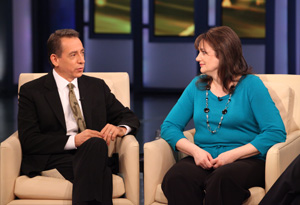
Still, Teri says the abuse continued. Three years—and two kids—later, Teri left David. "He was very particular about the way I did everything, from how I stacked the dishes on the counter to how I folded his underwear to how the cans were straight in the pantry," she says. "I would go around the house all day and make sure everything is the way he wants and make sure he doesn't have anything to complain about."
Although she left, Teri, like so many women in her situation, was not yet out of danger. In fact, Gavin says most spousal murders happen after the woman leaves. "About 77 percent of the time," he says. "That's why you need help because separation, estrangement, that's the time that the homicides happen."
Gavin's advice on how to safely leave a violent situation with children
Teri says David's violent behavior continued even after she left. "We had police intervention many times. We shared custody of our two daughters, so there was always that back and forth. We always had to see one another," she says. "The name-calling, the hitting—it just continued to get worse and worse. The thumbing the nose at the court orders. Anything he could possibly do to stay in control and to say, 'I am in charge.'"
Gavin says abusers are typically controlling and exercising complete control means giving the other person a lot of attention. "We're brought up to think attention equals love," he says. "Control doesn't equal love."
Although she left, Teri, like so many women in her situation, was not yet out of danger. In fact, Gavin says most spousal murders happen after the woman leaves. "About 77 percent of the time," he says. "That's why you need help because separation, estrangement, that's the time that the homicides happen."
Gavin's advice on how to safely leave a violent situation with children
Teri says David's violent behavior continued even after she left. "We had police intervention many times. We shared custody of our two daughters, so there was always that back and forth. We always had to see one another," she says. "The name-calling, the hitting—it just continued to get worse and worse. The thumbing the nose at the court orders. Anything he could possibly do to stay in control and to say, 'I am in charge.'"
Gavin says abusers are typically controlling and exercising complete control means giving the other person a lot of attention. "We're brought up to think attention equals love," he says. "Control doesn't equal love."

Teri eventually remarried and continued to share custody with David. On Saturday, January 31, 2004, five years after her divorce, Teri drove to David's Wisconsin house to pick up the girls. When she arrived, David told Teri the girls were playing hide-and-seek and invited Teri inside. "My gut was saying, 'Why is he letting me come in his house?'" she says. "Right away I knew this is kind of weird. He hasn't allowed me in his house since the day I left. "
Still, Teri says she talked herself out of the feeling. "I was cold. My car was running out of gas," she says. "Most of all, my kids were hiding. They wanted me to come find them, and I didn't want to disappoint them."
But Teri didn't get the chance to play. "I walked into the foyer, and I remember saying, 'Gee, I wonder where they are?'" she says. "And, bam, a blow to the back of the head."
Teri says David continuously struck her with a baseball bat. "He said: 'You always said I abused you. Now you can see what abuse really is."
David started to strangle Teri. "He was saying: 'Go to sleep. Just go to sleep. Just stop breathing,'" she says. "He was mad again that he was ordering me to stop breathing and I wasn't."
Teri says David then duct-taped her wrists, ankles and entire face and head. "He then had this big garbage can. I could feel he was putting me in it," she says. "I'm bleeding everywhere. I'm in this garbage bin, and he's filling it up with snow. What started going through my head was, 'I'm going to die today.'"
Still, Teri says she talked herself out of the feeling. "I was cold. My car was running out of gas," she says. "Most of all, my kids were hiding. They wanted me to come find them, and I didn't want to disappoint them."
But Teri didn't get the chance to play. "I walked into the foyer, and I remember saying, 'Gee, I wonder where they are?'" she says. "And, bam, a blow to the back of the head."
Teri says David continuously struck her with a baseball bat. "He said: 'You always said I abused you. Now you can see what abuse really is."
David started to strangle Teri. "He was saying: 'Go to sleep. Just go to sleep. Just stop breathing,'" she says. "He was mad again that he was ordering me to stop breathing and I wasn't."
Teri says David then duct-taped her wrists, ankles and entire face and head. "He then had this big garbage can. I could feel he was putting me in it," she says. "I'm bleeding everywhere. I'm in this garbage bin, and he's filling it up with snow. What started going through my head was, 'I'm going to die today.'"

After being shoved into a garbage can, Teri began the fight of her life. "He put me on the back of his truck and actually he went back in the house and I knew it had to be to get the kids," she says. "Knowing that they were 4 and 6, it would take a few minutes."
Remembering she had her cell phone in her pocket, Teri managed to dial 911. "It took just a few minutes and I heard sirens. But by that time, he came back to the truck, started it up and we were on our way," she says. "The police were looking at his home for something and didn't know that we were on the road. So I heard the sirens pass me right up."
Teri then called her new husband. "I just remember him saying: 'Just hang up and call 911. Save your battery,'" she says. "I thought at the time that I had hung up right away from him and called 911. Later on I found out it was about an hour later. So I was blacking in and out."
Remembering she had her cell phone in her pocket, Teri managed to dial 911. "It took just a few minutes and I heard sirens. But by that time, he came back to the truck, started it up and we were on our way," she says. "The police were looking at his home for something and didn't know that we were on the road. So I heard the sirens pass me right up."
Teri then called her new husband. "I just remember him saying: 'Just hang up and call 911. Save your battery,'" she says. "I thought at the time that I had hung up right away from him and called 911. Later on I found out it was about an hour later. So I was blacking in and out."

When Teri called 911 again, she got dispatch from a different county. As she learned later, David had hitched Teri's car to his truck and dumped it off in another city. "He had the girls with him in the front of the cab," she says.
After the car was gone, Teri made a desperate attempt to attract attention in the back of the truck. "At one point I thought, 'I'm going to stick my hand out, because the lid wasn't on the garbage can, and somebody is going to see a hand hanging out and call the police," she says. "His truck stopped after that. He came back. I was either hit in the head with a baseball bat or kicked."
Teri said David threatened her. "[He said,] 'I'll get out my .38, one more stunt like that."
Then, Teri's only connection to the outside world was ripped away. "At that point, my phone rang," she says. "He took the phone. He got back in the cab, drove around. I was blacking in and out. I had no idea how long it was."
After the car was gone, Teri made a desperate attempt to attract attention in the back of the truck. "At one point I thought, 'I'm going to stick my hand out, because the lid wasn't on the garbage can, and somebody is going to see a hand hanging out and call the police," she says. "His truck stopped after that. He came back. I was either hit in the head with a baseball bat or kicked."
Teri said David threatened her. "[He said,] 'I'll get out my .38, one more stunt like that."
Then, Teri's only connection to the outside world was ripped away. "At that point, my phone rang," she says. "He took the phone. He got back in the cab, drove around. I was blacking in and out. I had no idea how long it was."
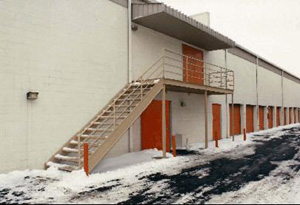
Eventually, Teri says the car stopped. As she learned later, David had driven across state lines to Illinois and stopped at a storage facility. He left her inside an unheated storage locker in January. "All I remember is boxes and all these things being slid against the floor," she says. "I had no idea where I was."
Teri says intuition told her to play dead. Then, Teri says David stacked anything he could on top of and around the garbage can. "There was no way I was getting out of there," she says.
Teri says intuition told her to play dead. Then, Teri says David stacked anything he could on top of and around the garbage can. "There was no way I was getting out of there," she says.
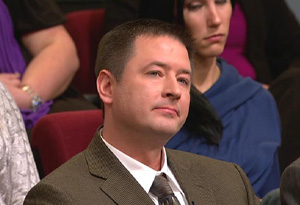
Meanwhile, police in Wisconsin and Illinois were working around the clock to find Teri during her 26 hours in hell. Authorities were tipped off by Teri's first call, which they interpreted as a woman who had difficulty breathing.
When police arrived at the house, they saw signs of struggle. Suspicions escalated as neighbors reported seeing Teri's car hitched to David's truck. During this time, Teri's current husband had also called 911, and an Amber Alert was issued.
Det. Chris Schmaling says David was arrested at work right after leaving Teri in the storage locker. "He's picked up, and he's real matter of fact," Det. Schmaling says. "[We said]: 'There's an Amber Alert. Where's your wife? Where's your kids?' [He said], ' I just dropped my children off at Elmwood Park, Illinois, to a girlfriend's house' and hasn't seen Teri since the Wednesday prior."
When police arrived at the house, they saw signs of struggle. Suspicions escalated as neighbors reported seeing Teri's car hitched to David's truck. During this time, Teri's current husband had also called 911, and an Amber Alert was issued.
Det. Chris Schmaling says David was arrested at work right after leaving Teri in the storage locker. "He's picked up, and he's real matter of fact," Det. Schmaling says. "[We said]: 'There's an Amber Alert. Where's your wife? Where's your kids?' [He said], ' I just dropped my children off at Elmwood Park, Illinois, to a girlfriend's house' and hasn't seen Teri since the Wednesday prior."

After six hours of interrogation, David asked for a break—and detectives went through his wallet, which was packed with business cards. "[He] goes back to his cell, wraps himself in a warm blanket and falls fast asleep. Unbeknownst to us, she's lying there dying," he says. "So we go back, we take a look at this wallet, we find a business card. That business card is to a storage facility in Wheeling, Illinois."
Suspicious that a Wisconsin man had a storage locker in Illinois, Det. Schmaling and his partner, Det. Keith Dobesh, called the number on the card. "The storage facility said he had been there the prior day," Keith says. "They had gone out to the unit, and they had actually heard her voice inside the unit pleading for help."
Teri had been trapped for more than 20 hours in the freezing cold. Doctors estimate Teri only had an hour left to live when she was discovered—her body temperature dropped to 84 degrees. She eventually lost all of her toes to frostbite.
Suspicious that a Wisconsin man had a storage locker in Illinois, Det. Schmaling and his partner, Det. Keith Dobesh, called the number on the card. "The storage facility said he had been there the prior day," Keith says. "They had gone out to the unit, and they had actually heard her voice inside the unit pleading for help."
Teri had been trapped for more than 20 hours in the freezing cold. Doctors estimate Teri only had an hour left to live when she was discovered—her body temperature dropped to 84 degrees. She eventually lost all of her toes to frostbite.
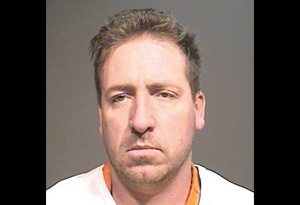
David is now serving a life sentence for kidnapping and attempted murder. Though he's behind bars, Teri says she still fears him. "He's an angry, bitter person that will never ever change," she says.
Teri also says David never showed any remorse in court. "The judge even said to him, 'Would you like to say anything?' And he said, 'Not at this time.' And the judge said, 'This is your time,'" she says. "He didn't even have the decency to get up and say, 'I don't care about Teri, but I'm sorry what I did to my kids.'"
Gavin says all abuse cases are tough, but it's even more difficult to leave when there are children involved. "We learned that being out of a relationship, particularly if there's custody and children, you're not really out of it. You're just out of it on paper," he says. "Getting truly out of it takes a lot of work and a lot of effort, and you can't do it alone."
Seek help, Gavin says. Women looking to leave a violent situation with their children can turn to TheHotline.org, call the National Domestic Violence Hotline (1-800-799-SAFE) or contact a local battered women's shelter. "There is no other way to develop all that you'd have to do," he says. "It's like going into the witness protection program. There are so many parts to an escape plan."
Teri also says David never showed any remorse in court. "The judge even said to him, 'Would you like to say anything?' And he said, 'Not at this time.' And the judge said, 'This is your time,'" she says. "He didn't even have the decency to get up and say, 'I don't care about Teri, but I'm sorry what I did to my kids.'"
Gavin says all abuse cases are tough, but it's even more difficult to leave when there are children involved. "We learned that being out of a relationship, particularly if there's custody and children, you're not really out of it. You're just out of it on paper," he says. "Getting truly out of it takes a lot of work and a lot of effort, and you can't do it alone."
Seek help, Gavin says. Women looking to leave a violent situation with their children can turn to TheHotline.org, call the National Domestic Violence Hotline (1-800-799-SAFE) or contact a local battered women's shelter. "There is no other way to develop all that you'd have to do," he says. "It's like going into the witness protection program. There are so many parts to an escape plan."

Gavin says there are two things anyone can do to prevent an ordeal like Teri's from happening: Spot red flags early on and trust your instincts. "The best thing is identifying these warning signs before you get into relationships and before you get kids, when it's possible," he says. "At those times, the men are usually less invested emotionally. It's much easier to end a relationship early than it is to end it later on because of that emotional investment."
Get the warning signs.
"I often say the first time a woman is beaten, she is a victim. And the second time, she is a volunteer," he says. "That's a very controversial thing for some people because they think I'm blaming the victim. But what I'm actually doing is saying, 'If you don't recognize that staying in that relationship is a choice, you'll never recognize that leaving the relationship is a choice.'"
Take Gavin's assessment to help determine if you or a loved one is at risk
Get the warning signs.
"I often say the first time a woman is beaten, she is a victim. And the second time, she is a volunteer," he says. "That's a very controversial thing for some people because they think I'm blaming the victim. But what I'm actually doing is saying, 'If you don't recognize that staying in that relationship is a choice, you'll never recognize that leaving the relationship is a choice.'"
Take Gavin's assessment to help determine if you or a loved one is at risk



